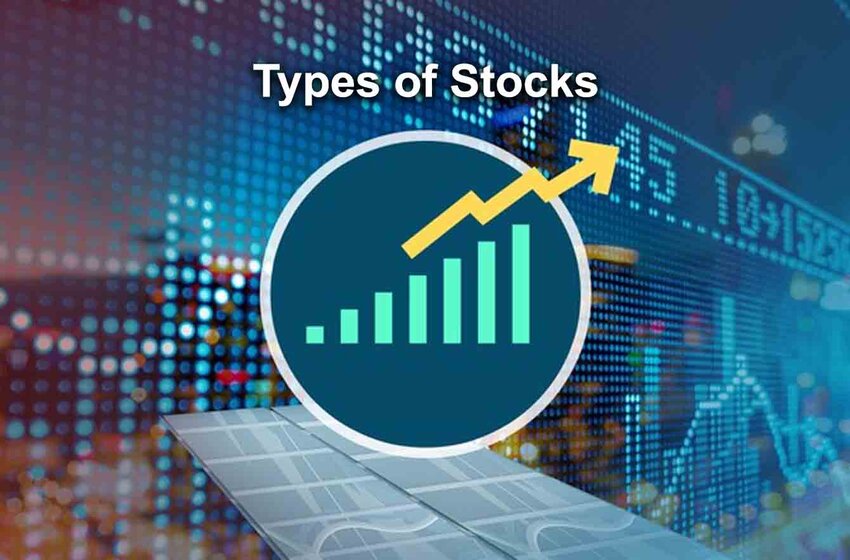
7 Types Of Stocks All Investors Should Know About
- Stocks
 Yaseer Rashid
Yaseer Rashid- February 23, 2022
- 0
- 7 minutes read
When most people think of stocks, the first thing that comes to their mind are the publicly listed shares that are traded on the stock exchange. However, it is crucial for investors to know the varied types of stocks that are available and understand their unique features, and be able to evaluate when they may portray an appropriate investment.
In this article, we have outlined varied categories of stocks, targeting to take off the confusion of various classes of stocks for investors. So if you are wondering what are the types of stocks are then this article is right for you.
7 Types Of Stocks In The Market
A stock is an investment into a public entity. When a company sells stock shares to the public, those are typically issued after the companies divide them into classes so that the voting rights of the shareholders can be differentiated. So with that let us have a look at the varied types of stocks for beginners and experienced investors that are presently operating in the market.
1. Common And Preferred Stocks
Common stocks which are at times termed as ordinary stocks portray partial ownership in an entity. This class of stock entitles investors to gain profits that are usually paid in dividends. Common stakeholders elect the board of directors of the company and also vote on the corporate policies of that company. Holders of this class of stock have rights to the asset of the company in a liquidation event, but only after the preferred stock shareholders and other debt holders have been paid. Common stocks are typically received by the employees and founders of the company.
2. Growth Stocks Vs Value Stocks
As their name suggests, growth stocks implies equities that are expected to increase at a faster rate in comparison to the broader sector. Generally, growth stocks tend to operate during times of economic growth and when rates of interest are low. For example, technology stocks have prominently outperformed in recent years, navigated by a robust economy and access to low cost funding. Investors can track growth stocks by following the themed ETF (exchange-traded fund), the SPDR Portfolio S&P 500 Growth ETF (SPYG).
Conversely, value stocks are traded at a discount to what a performance of a company might otherwise indicate, generally having more lucrative valuations than the broader market. Value stocks, like healthcare, financial, and energy names generally outperform during times of economic recovery, as they usually offer reliable income streams. Investors can monitor value stocks by adding the SPDR Portfolio S&P 500 Value ETF (SPYV) to their watchlist.
3. Income Stocks
Income stocks are equities that offer regular income by dispensing the profits of a company, or excess cash, via dividends that are greater than the market average. Typically, these stocks have lower fluctuations and less capital appreciation compared to growth stocks, making them appropriate for risk-averse investors who look for a regular income stream. Investors can access income stocks via the Amplify High Income ETF (YYY).
4. Blue-Chip Stocks
Blue-chip stocks are well-situated companies that have a great market capitalization. They have a long successful record of developing dependable earnings and leading within their sector or industry. Conservative investors in this case may top-weight their portfolio with blue-chip stocks, specifically in periods of uncertainty. Several instances of blue-chip stocks are fast-food leader McDonald’s Corporation (MCD), computing giant Microsoft Corporation (MSFT), and energy bellwether Exxon Mobil Corporation (XOM).
5. Defensive Stocks
Defensive stocks mostly offer consistent returns in most economic scenarios and stock market environments. These entities typically sell important services and products, like healthcare, consumer staples, and utilities. Defensive stocks may help safeguard a portfolio from steep losses during a bear market or sell-off. A defensive stock may also be a value, income, or blue-chip stock. Healthcare multinational Cardinal Health, Inc. (CAH) and Telecommunications giant AT&T Inc. (T) are among the defensive stocks that are included in the core holdings of the Invesco Defensive Equity ETF (DEF).
6. IPO Stock
This is one of the most common types of stocks. When an entity goes public, it issues stock via an IPO (initial public offering). IPO stock is typically allocated at a discount before the stock of the company lists on the stock exchange. It may also have a vesting schedule to safeguard investors from selling all of their shares when the stock begins trading. Market commentators also use the term “IPO stocks” when implying to recently listed stocks. Investors can track for upcoming IPOs via the Nasdaq website.
7. Penny Stocks
A penny stock is an equity that is valued at less than $5 and is thought to be highly speculative. Even though some penny stocks trade on big exchanges, many trade via the OTCQB which is a middle-tier over-the-counter (OTC) market for U.S. stocks functioned by OTC Markets Group. Investors should use limit orders when placing purchase and sell orders in penny stock, as they often have a large spread among the bid and ask price.
The Bottom Line
Evaluating the key differences among the various types of stocks helps investors make informed and better investment decisions and handle risk within their portfolios. Along with purchasing varied types of stocks directly, investors can receive cost-effective exposure to themed stock types via ETFs.

